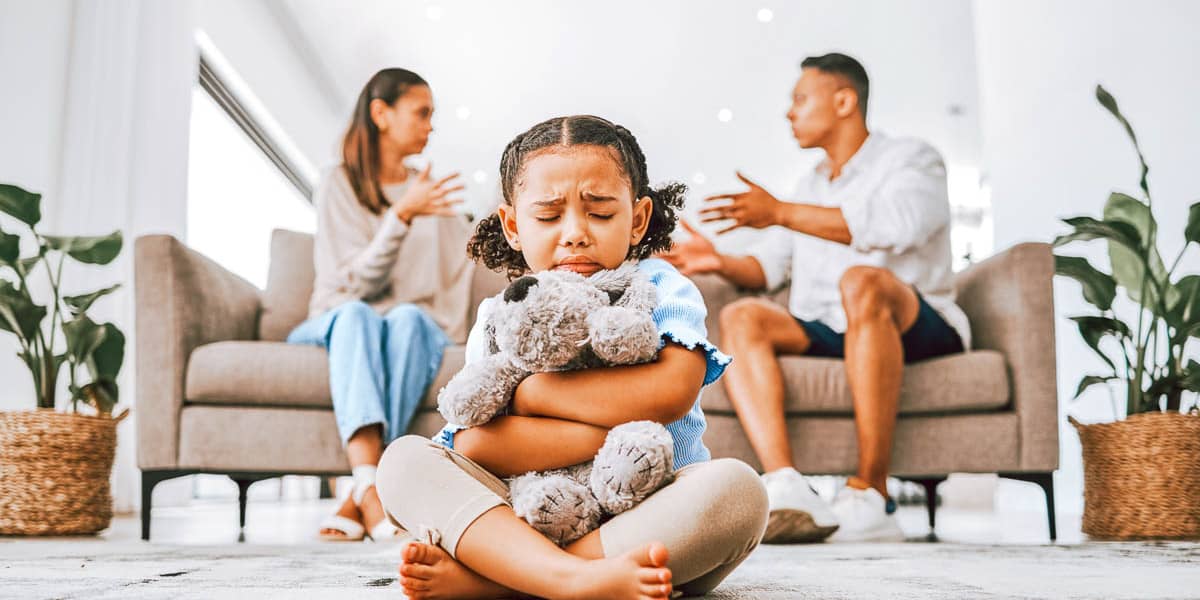How Negative Talk about Your Ex Can Hurt Your Kids

Anger, heartbreak, confusion – you’re still struggling with intense emotions after your divorce. Your kids are struggling, too.
While you have every right to feel the way you do and should work through those feelings, the manner in which you express your emotions around your child can affect them in ways unseen. The things you say not only shape their current emotional responses but also their future understanding of relationships – even how they cope with conflict as adults.
Suggested: Narcissistic Parental Alienation: Signs to Watch For
Negative talk equals negative consequences
Kids learn about life by absorbing what’s going on in their surroundings. They’re highly attuned to the emotional climate around them. This begins when they are babies, and any disharmony between the people responsible for their survival can upend their sense of security.
After your divorce, assume that anything you say about your ex-spouse in front of your child will be taken to heart.
Your ex is still their parent, after all. Even if they’ve been an awful spouse, they are the only mom or dad your child will ever have. Regardless of what transpired in your marriage, your child needs to feel good about both of you in order to feel good about themselves.
Your child may feel sad and depressed
Your child relies on you and your ex for their feelings of self-worth and safety. When their security is rocked, suddenly, nothing feels safe anymore.
Even for the most well-adjusted child, divorce is a difficult time.
What’s more, kids often lack the cognitive tools to differentiate between your feelings for your ex and your ability to love them. So, if you speak negatively about your ex – even if you think your comments are relatively insignificant – your child may question the security of your love for them. After all, you and your ex once loved each other. Now you don’t.
Could your love for them also be that impermanent?
Suggested: Understanding and Protecting Kids’ Mental Health in Divorce
Your child may blame themselves
Young children view the world and their family members through egocentric eyes. Bottom line, you know your marital problems were far more significant than something your child could have caused ... but they don’t know that.
Young kids simply don’t understand that they didn’t cause your divorce. Often, they blame themselves for their parents’ divorce or other things that go wrong.
So, if your child hears you make negative comments about your ex, they may feel that they’re the cause. They may wonder if they did something to prompt your split. They may think Mom and Dad would still be husband and wife if they’d only done better in school, helped around the house more, or behaved better.
A child’s misplaced feelings of responsibility and guilt can chip away at their self-esteem and sense of security.
Your child may develop harmful coping mechanisms
Older kids often react to conflict between their parents by internalizing their feelings. If you talk negatively about your ex, they have no way to process it and may react in unhealthy ways, such as abusing drugs or alcohol, developing behavioral issues, or self-harming as a way of coping.
As kids of divorce grow into adults, they may even see their own relationships through the hurt of their parents’ divorce. They may therefore be unable to develop healthy boundaries or relationships for fear of suffering the same kind of hurt.
Your child may develop a negative relationship with you or your ex
While you may have good reason to feel angry at your ex, your child is still entitled to a relationship with both parents. If they hear enough negative things about your ex, however, they may feel forced to take sides.
Your child may feel more loyal to you and shut your ex out. Or, they may resent how you talk about your ex and stick up for them, thereby causing your relationship with them to suffer.
It’s unfair and unhealthy to put your kids’ relationship with either parent at risk because of your hurt and anger.
Suggested: Narcissistic Parental Alienation: Signs to Watch For
Healthy alternatives to negative talk about your ex
Your feelings are valid and real, and you have a right to express them. But it’s not in your child’s best interest to express them to or in the vicinity of your child. Consider some healthier ways to let your feelings out so you can process your anger and get beyond it.
Journaling
Journaling can be a safety valve when feelings become too much. Transforming negative emotions into words allows you to get some distance, better understand them, and find ways to let them go
Confiding in friends and family
Confiding in a trusted family member or friend can be a safe platform if you need to verbalize your feelings. Getting some outside understanding and support helps you release your pent-up emotions without involving your kids.
Join a support group
Support groups help you connect with others in similar circumstances. Sharing and hearing others’ experiences helps you realize you're not alone. It can also provide other ways of seeing and dealing with your emotions.
Get the help of a therapist
Professional therapists are trained to listen without judgment, help you process your emotions, and teach you healthy coping mechanisms so you can move beyond your hurt and anger and focus on your well-being and personal growth.
Divorce can be a treacherous journey for all involved, but you’re not alone. At Hello Divorce, we provide affordable divorce plans to ease you through the divorce process. If you need additional help, we also offer professional services and a library of valuable resources to guide you. Schedule a free call to find out more.



